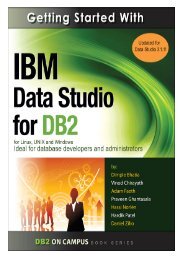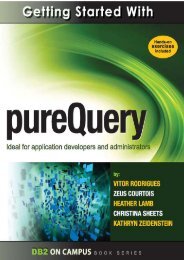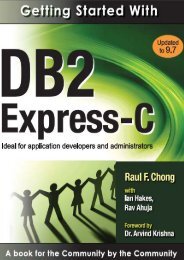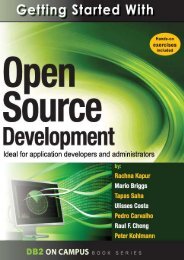Getting Started with Open Source Development
You also want an ePaper? Increase the reach of your titles
YUMPU automatically turns print PDFs into web optimized ePapers that Google loves.
68 <strong>Getting</strong> started <strong>with</strong> open source development<br />
Contributing <strong>with</strong> code for the desired feature may take you weeks, but in the process you<br />
will learn tones of new and interesting information, gain a few ideas that would make that<br />
software snappier and meet people from all over the world who share the same passion<br />
you do; like the one of sitting alone at night <strong>with</strong> a stash of chips and a can of coke,<br />
cracking a problem like a mad man in pajamas, waiting for the moment the solution comes<br />
down that stairway from heaven, and rejoicing when it arrives by dancing <strong>with</strong> his cat.<br />
<strong>Open</strong> source communities are full of people like this, well, maybe not all of them dance <strong>with</strong><br />
their cats, but they love to be challenged and aren’t afraid to get involved. For them<br />
opportunity often appears from necessity, which generates motivation which then mutates<br />
into fun and responsibility.<br />
If you are reading this book, we assume you are interested in open source, and if you<br />
haven’t already contributed in some way, maybe it's because you don't know where or how<br />
to start. Well, as many things in life, you have to find the need first; motivation is just not<br />
enough. By "need" we mean that you should search for a project you have a special<br />
interest in, for instance, start by looking for the ones you use on a day-to-day basis.<br />
Take GNU/Linux for example. Many of us in the open source community use GNU/Linux<br />
daily, for it is a very robust, very powerful operating system, and <strong>with</strong> its many distributions<br />
it makes for a very good playground for people to enter the FLOSS community. Debian is<br />
one of those distributions, one of the oldest as a matter of fact, and it drives itself from a<br />
strict belief in free software as depicted in their "social contract", which guarantees you that<br />
in a bare installation, Debian contains only free software. Of the thousands of applications<br />
that make up Debian or almost any other distribution, many have their own community.<br />
Debian itself has a community.<br />
It is then a matter of time that in your daily routine taming around your computer, you strike<br />
a bug in one of the thousands of software that make up Debian. Impaired and <strong>with</strong> no other<br />
alternative to continue whatever is you were doing, you look for a way to solve it. The bug<br />
hunting leads you to a little library <strong>with</strong> a very simple mission, intrigued you want to know<br />
more about that little library. Fortunately it is not hard in the open source world to find good<br />
documentation even to the simplest piece of software; good documentation guarantees<br />
project continuity and enables community feedback. Even small libraries like this one that<br />
is bugging you may have a community attached. It comes to no surprise, libraries are used<br />
by bigger applications, and the developers of these applications rely on these libraries for<br />
very specific functionalities; it’s a mutual interest. If you are lucky, you may even find a bug<br />
tracking tool. For some of the smaller software projects that have no need for a bug<br />
tracking tool, the project leader normally goes <strong>with</strong> a simpler and centralized feedback<br />
platform, like a forum. It’s very hard to be the first to find a bug in a community as large as<br />
Debian’s, rest assure that if this example were to suit reality someone would have already<br />
fill in the bug for you. But in this reality you are the master, checking out every bug that<br />
bugs you. A little debugging <strong>with</strong> a proper software tool, a simple run through the source<br />
code and there it was. Five minutes later you have set up a patch, you go into the bug<br />
tracking tool and submit it, a few hours later one of the developers picks it up, merges it<br />
into the main code and redistributes it. Your good deed for the day is done.

















